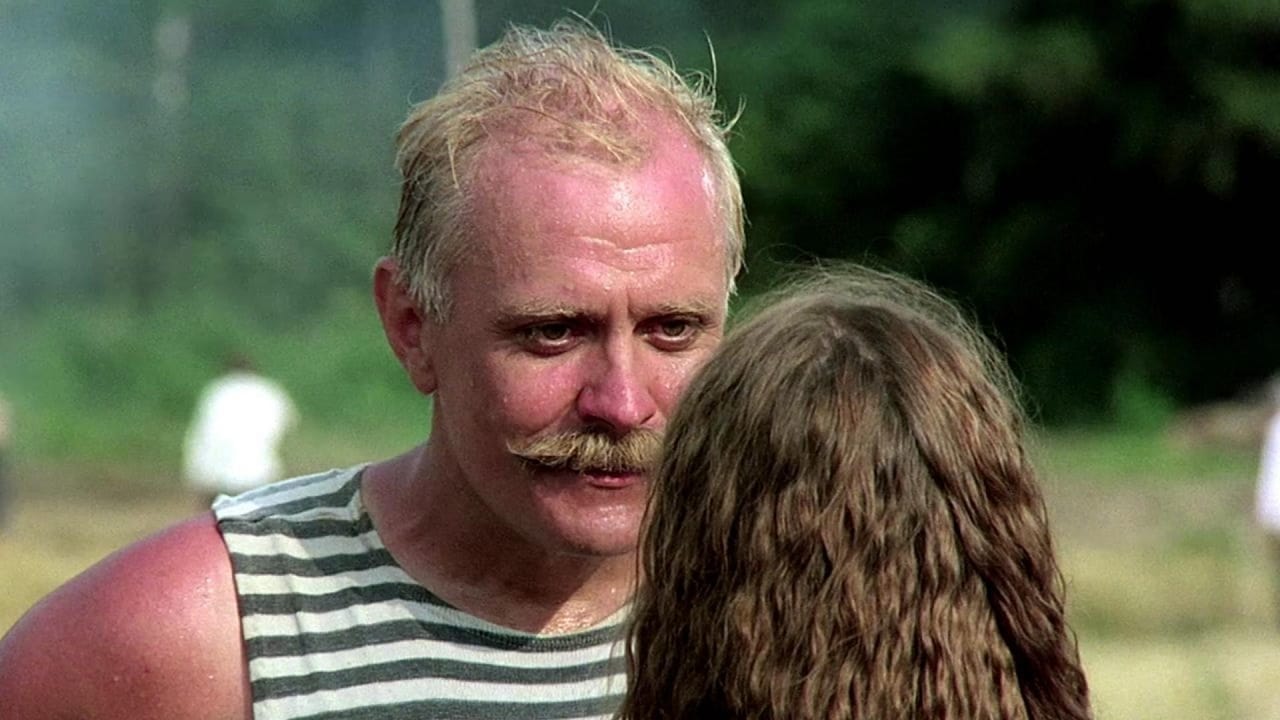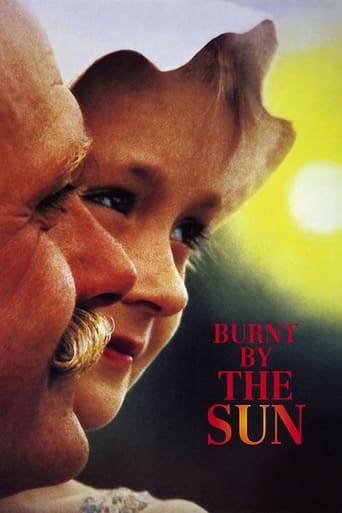

An attempt to show how an ordinary Russian family in the 1930's could be affected by the Stalinist purge of its head; this is certainly a worthwhile goal. But the movie is full of eccentric people, full of sadistic gaiety in the face of what is coming, and is very tedious to watch. I think it is largely a failure and I did not enjoy it one bit.
... View MoreBurnt by the Sun is a propaganda film made in Russia. Nikita Mikhalkov exemplifies Stalin's reign as a force of terror that destroys all facets of life. The scene is set in the middle 1930s with a seemingly happy family under Stalin's rule. Sergie Kotov is a retired war hero and a very respected man amongst his village peers. Along with Kotov's (nearly) likable character, the movie also followed around a bright orb (sun) that ruined (burned) everything it came near. This orb became a clear metaphor for Stalin's rule. Nikita Mikhalkov's film was released in 1994 but the premise is in the heart of Joseph Stalin's tenure. Literature and movie censorship was at an all-time high during the Stalin era. Russians that made images that negatively portrayed communist Russia were banned all together. Even a film that featured Gary Oldman and Tom Hardy recently (April 2015) was forced to stop production because of negative publicity about the Stalin days. Even though this film does not directly point to Stalin's paranoia there is no mistaking the distaste Mikhalkov had for this time period. This writer enjoyed how Kotov was built up through the storyline. To the everyday civilian, Kotov was very respected but not feared. Not feared in a sense that a nearby villager can interrupt Kotov's day off in order to protect the villages' interests. On the other hand, his wife might hate him but I hear that is a rather common thing nowadays. All in all, the audience could see Kotov as the general 'good guy' of the picture. Kotov was enamored with mother Russia. One could decipher from the dialect that Kotov was a loyalist to his country. Pictures of Kotov and Stalin proudly placed within his home as well as having a personal line directly to Stalin. But his loyalty and years of dedication could not protect Kotov from Stalin.A golden orb was seen thrashing and destroying everything in its path for the duration of the film. The orb is thought to be Stalin's power that stretches as far as the sun can reach. The fireball can be seen traveling from scene to scene; once it came inside a home and destroyed a picture frame (family), a random tree (maybe the environment around you), and even Mitia (oneself). The best characters in the picture were Mitia and Nadia. Mitia was a hot and cold type of character. He was either the most animated character or the most depressing. On the other hand, Nadia stole the show. Nadia brought a liveliness that cannot be matched. It was definitely one of the best child performances on the big screen. Overall, Mikhalkov view on life in the mid 1930s was eye opening and informative. This slow paced film might have been in trouble if it weren't for Nadia's performance.
... View MoreThis is an interestingly broken-backed film. Set during the Stalinist era during one idyllic summer, it begins by contrasting the lives of Dmitriy (Oleg Menshikov) and Sergey (Nikita Mikhailkov) - the one a dilettante musician and pianist, the other a colonel in the Russian army and favorite of the premier. They both have a claim on Marusya (Ingeborg Dapkunaite): Srgey is married to her, and Dmitriy was a former lover of hers. It seems that the film's moral scheme is relatively straightforward: Dmitriy is talented but feckless, while Sergey seems virtually untouchable - not only does he have a great career, but he is happily married as well. However director Mikhailkov turns the tables on our expectations and thereby transforms BURNT BY THE SUN into a penetrating analysis of how dictatorships corrupt everyone around them. Concepts of 'good' and 'evil# no longer prevail: everyone simply does what it takes in order to survive. The ending is both shocking yet predictable. Visually speaking, the film contrasts the idyllic surroundings of Dmitriy's dacha with the behavior of the protagonists - it seems that no one can actively enjoy the delights of glorious summer weather, for fear of being discovered. Life at that time must have been precarious, with no one actually being sure as to what would happen to them next. BURNT BY THE SUN is slow-moving, but Mikhailkov's camera has an eye for telling detail and significant gestures. Definitely worth watching.
... View MoreYou can see why this got the best foreign language Oscar: an anti-communist Russian film - the Americans must have been purring. It's a decent film, basically sentimental (like The Pianist) though nothing to rave about. The General's tender relationship with his wife and child, with which we are beaten around the head for a couple of hours, is far less interesting than the almost shocking idea of post-revolutionary Russia in shimmering colour, where the sun still shines and people still picnic by the river - looking nothing at all like Eisenstein et al had it.Apparently, folks still hung out at the dacha in those days, and here we have the usual genteel bunch in white flannels as if transplanted from a Bergman film. Mikhalkov wants us to know and like them all, but the film would be leaner and better without the extra baggage. Plenty of scenes are vaguely unsatisfactory, like a joke told by someone you don't like. There is a "fireball" motif which doesn't work at all. But the real problem is that all the scene-setting means two hours of beating around the bush (literally, in some scenes), in order to set up the powerful and moving final ten minutes, which has beating of another kind, and which appears to come straight out of the Coen brothers.
... View More